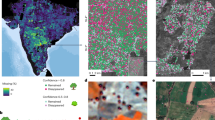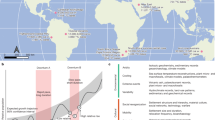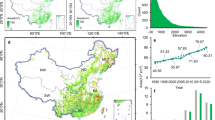Abstract
The climate of the Northern Hemisphere changed during recent centuries, as shown by the Little Ice Age episode1 and the warming trend of the past 100 years2,3. The ecological impacts of these changes have yet to be evaluated in several terrestrial ecosystems, incorporating direct evidence such as detailed botanical field observations4. We report here results of the analysis of a ∼600-year response of a lichen–spruce woodland to this long-term trend, which are thought to be the first extensive illustration of these impacts in the Subarctic. It suggests that tree-line vegetation is in a dynamic equilibrium with climate in the absence of other external disturbances; this is emphasized by spruce reaction through phenotypic adaptation—a shift from stunted individuals (krummholz) to normal trees (forest)—and differential regeneration. This study produces evidence that marginal northern forests can persist through time and that successional processes, in the absence of fire, perpetuate the original lichen–spruce facies. The longest tree-ring chronology (AD 1398–1982) yet available in eastern North America was constructed from living and dead spruces found in the lichen woodland of our study.
This is a preview of subscription content, access via your institution
Access options
Subscribe to this journal
Receive 51 print issues and online access
$199.00 per year
only $3.90 per issue
Buy this article
- Purchase on Springer Link
- Instant access to full article PDF
Prices may be subject to local taxes which are calculated during checkout
Similar content being viewed by others
References
Lamb, H. H. Climate, Present, Past and Future Vol. 2 (Methuen, London, 1977).
Jones, P. D., Wigley, T. M. L. & Kelly, P. M. Mon. Weath. Rev. 110, 59–70 (1982).
Kelly, P. M., Jones, P. D., Sear, C. B., Cherry, B. S. G. & Tavakol, R. K. Mon. Weath. Rev. 110, 71–83 (1982).
Oliver, C. D. & Stephens, E. P. Ecology 58, 562–572 (1977).
Payette, S. & Gagnon, R. Nature 313, 570–572 (1985).
Stuiver, M. Radiocarbon 24, 1–26 (1982).
Légère, A. & Payette, S. Arct. Alp. Res. 13, 261–276 (1981).
Fowells, H. A. Silvics of Forest Trees of the United States (Agricultural Handbook no. 271, U.S.D.A., 1965).
Scurfield, G. Science 179, 647–655 (1973).
Tranquillini, W. Physiological Ecology of the Alpine Timberline (Springer, Berlin, 1979).
Wardle, P. Arct. Alp. Res. 419–423 (1981).
Silvertown, J. W. Introduction to Plant Population Ecology (Longman, London, 1982).
Fritts, H. C. Tree Rings and Climate (Academic, New York, 1976).
Yamamoto, R. Proc. Tech. Conf. Climate, 360–375 (World Climate Programme, World Meteorological Organization no. 578 1980).
Strang, R. M. Can. J. For Res. 3, 140–143 (1973).
Author information
Authors and Affiliations
Rights and permissions
About this article
Cite this article
Payette, S., Filion, L., Gauthier, L. et al. Secular climate change in old-growth tree-line vegetation of northern Quebec. Nature 315, 135–138 (1985). https://doi.org/10.1038/315135a0
Received:
Accepted:
Issue Date:
DOI: https://doi.org/10.1038/315135a0
This article is cited by
-
Using tree rings to detect a CO2 fertilization effect: a global review
Trees (2023)
-
Historical temperature and wind conditions in the Hudson Strait region from 1880 to 1950: Kangiqsujuaq, Quaqtaq, and Killiniq
Climatic Change (2023)
-
Sufficient conditions for rapid range expansion of a boreal conifer
Nature (2022)
-
Neighborhood interactions influencing tree population dynamics in nonpyrogenous boreal forest in northern Finland
Plant Ecology (2006)
-
Unsolved problems of Boreal regions
Climatic Change (1996)
Comments
By submitting a comment you agree to abide by our Terms and Community Guidelines. If you find something abusive or that does not comply with our terms or guidelines please flag it as inappropriate.



